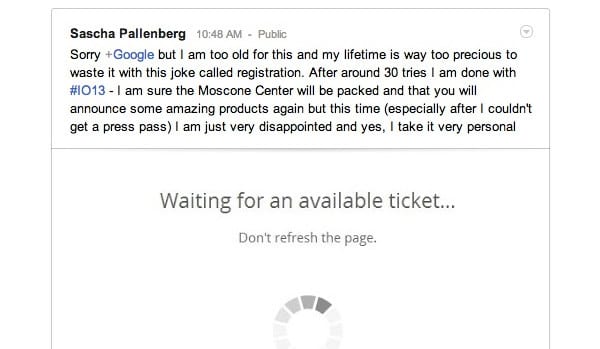
Tickets for Google's annual technology conference went on sale earlier today and, like in years past, there were several problems. Here's a quick look at what the search industry giant can learn from the ticketing industry, namely the art of the pre-sale.
Google's Goof
Every year in May, Google holds its technology conference called Google I/O to gather its network of developers together at the Moscone Center in San Francisco. While at I/O, attendees are given early previews of yet-to-be release technologies and programming tools. A tradition at I/O is the so-called “Oprah moment” when a new device, such as an Android phone or tablet, is given to each attendee for free. The value of the conference for those who work in technology is more than a free new phone, it enables the different projects attendees are working on to be discovered, and possibly acquired, by Google.
With so much value to be had, it isn't surprising that tickets to I/O are in extremely high demand, year after year.
Tickets for the 2013 I/O conference went on sale earlier today, but several familiar problems that have plagued the purchase process in years past, reared their ugly head yet again.
In order to get tickets, would be attendees must register on the official website and then go through a fairly standard purchase process. The issues ticket buyers have routinely experienced have been slow loading web pages, browser crashes and a screen “stuck” in between steps which cannot be refreshed without losing all the purchase cart data.
The resulting frustrations with the ticket buying experience end up being expressed, ironically, on Google's social media network Google Plus. Also mildly ironic is the role reversal the problematic I/O ticket sale represents.
Learn from the ticketing industry
Over the past decade, Google’s dominance in search has turned the ticketing industry on its head. Before Google, ticket buyers had little, if any, ability to find alternative ticket outlets at which to compare prices. Once the Internet revolution lifted the veil off of the ticketing industry, and consumer choices widened exponentially, the industry had to learn how to do business all over again.
Eventually the ticketing industry did learn from Google.
Today, with the problematic I/O conference ticket sale, it is Google that can learn from the ticketing industry, specifically the art of the pre-sale.
I/O conference registration opens to everyone in the world at the same time. As such, demand is so high even mighty Google (a company that has saved a copy of every web page ever created on its servers) cannot handle the demand.
The ticketing industry is an old hand at successful ticket sales for high demand events. One of the pressure relief tactics used is the venerable ticket pre-sale event. By scheduling a series of pre-sale events, demand is under more control and the potential for problems is lessened.
A great example of a scheduled series of ticket pre-sales is the upcoming tour by Depeche Mode:
Fans who purchase Depeche Mode’s new album on Amazon on or before April 1 will receive a unique code good for early access to a pre-sale beginning April 3. A pre-sale for Citi cardholders begins April 1. RSVPing to the band’s Facebook page begins the process for partaking in a fan pre-sale launching April 4. Live Nation begins its own pre-sale April 5. General on-sales start April 6.
The multiple pre-sales, each with tiered pricing, would be a good syllabus for Google to study and learn from going forward into future I/O conferences.
Admittedly, I/O is not a rock concert, so the search giant will need to modify the standard ticketing industry practice(s) to suit their needs - but anything would be better than the current process.
Google has the resources and the smart personnel to make buying tickets for their conference a better experience. But will they look to the ticketing industry for help?
The ThunderTix plan for trade shows and conferences includes the tools to schedule multiple pre-sale events. Our technology is powerful enough to be the ticketing software for a conference as big as Google I/O, yet it scales down to fit your needs (and budget).